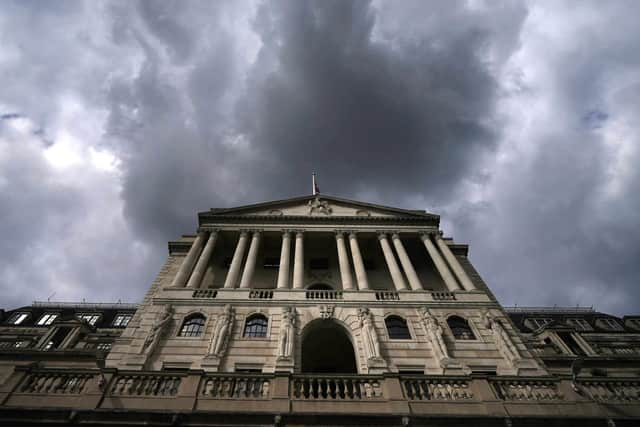UK inflation surprise: Markets bet on interest rate cut as early as March after bigger-than-expected fall
Having seen inflation more than halve this year teetotal PM Rishi Sunak is probably entitled to raise a glass or two of zero fizzy this Christmas after delivering on one of his top priorities.
A fall in the headline Consumer Prices Index CPI) measure of inflation to an annualised 3.9 per cent in November - its lowest level for more than two years - will also be cause for celebration for millions of borrowers and businesses, raising hopes of a new year cut in interest rates. CPI fell last month to the lowest point since September 2021 from 4.6 per cent in October, having been hovering in double-digit territory at the start of the year. Most economists had been expecting it to fall to 4.3 per cent last month.
Advertisement
Hide AdAdvertisement
Hide AdFalling fuel prices on the forecourt helped drive the bigger-than-expected fall, according to the official figures from the Office for National Statistics (ONS). Food prices also pulled down inflation, as they rose much more slowly than this time last year.


Hopes have been raised that the UK, like the US last week, may have reached an inflection point in the battle over inflation, though very few everyday products, other than petrol, are actually falling in price - merely rising less sharply. There are concerns that global tensions could stoke a fresh spike in oil prices while energy bills are expected to nudge upwards early in 2024 as the price cap is raised.
Even at 3.9 per cent, UK CPI is still running at almost twice the Bank of England’s 2 per cent long-term target. After opting to hold interest rates at 5.25 per cent last week, central bank policymakers remain hawkish, cautioning that inflation is more entrenched here than elsewhere.
Despite that uncertain outlook, Danni Hewson, head of financial analysis at AJ Bell, reckons that a cut in interest rates could come as early as March, offering hope for mortgage holders and other borrowers, though savers are likely to see rates cool. “Let’s not be churlish, the latest UK inflation numbers deliver a welcome shot in the arm for the UK economy,” noted Hewson. “Looking at rate expectations, there’s growing confidence that cuts to the base rate could begin as early as March and that by this time next year the economic landscape will look very different - more than one in 10 are now betting [interest] rates could fall back to below 4 per cent by next December.
“With around 1.5 million homeowners whose fixed rate mortgages are up for renewal in 2024, these numbers are likely to further increase competition amongst lenders to offer better and better deals,” she added.


The ONS confirmed that the Bank of England had not seen the most recent inflation figures before its latest rate decision. The inflation data showed that falling prices at the fuel pumps helped bring down the overall rate, with the average cost of petrol dropping by 4.1p a litre between October and December. Overall motor fuel prices fell by 10.6 per cent in the year to November 2023, compared with a drop of 7.6 per cent in the year to October.
CPI was also pulled lower by a slowdown in the pace of annual food price inflation, which dropped to 9.2 per cent last month, down from 10.1 per cent in October, and the lowest rate since May last year.
Helen Morrissey, head of retirement analysis at financial platform Hargreaves Lansdown, said the latest fall had big implications for people’s finances. She noted: “Such a drop could be taken as a sign that the Bank of England has gone as far as it needs to in its interest rate hiking cycle. Keeping the pause button pressed will be welcome news for those on variable rate mortgages who have seen their costs rise as well as those with credit card debt. Fixed rate mortgages could fall slightly, as the prospect of further rate rises fade but we’re not expecting any big moves until the market starts to expect a rate cut - which could be some time off yet.”
Advertisement
Hide AdAdvertisement
Hide AdAmanda Aumonier, director of mortgage operations at Better.co.uk, believes that a cut in rates is unlikely to take place in the first half of 2024, with thousands of homeowners who still have to come to the end of their ultra-low fixed-rate deals in for “a shock”.
She said: “A decrease in inflation should typically prompt the Bank of England to consider cutting interest rates, however, current indications suggest that [bank governor] Andrew Bailey will keep the base rate at 5.25 per cent for at least the first six months of the upcoming year, which means mortgage interest rates are likely to stabilise for the time being.”
Glancing into his crystal ball, Thomas Pugh, an economist at audit, tax and consulting firm RSM UK, said the upbeat news on inflation suggested that the first interest rate cut “may be closer than we had thought”. He added: “Inflation is now almost a full percentage point below the forecast the monetary policy committee made only back in November. If this trend continues it suggests that the MPC may be able to start cutting interest rates as early as May.
“However, while [this] data is good news for the economy it is worth sounding a note of caution. Services inflation at 6.3 per cent is still far too high for the MPC to be comfortable with and unless wage growth slows sharply, the MPC may not be ready to cut interest rates as early as the market is now pricing in.”
Comments
Want to join the conversation? Please or to comment on this article.